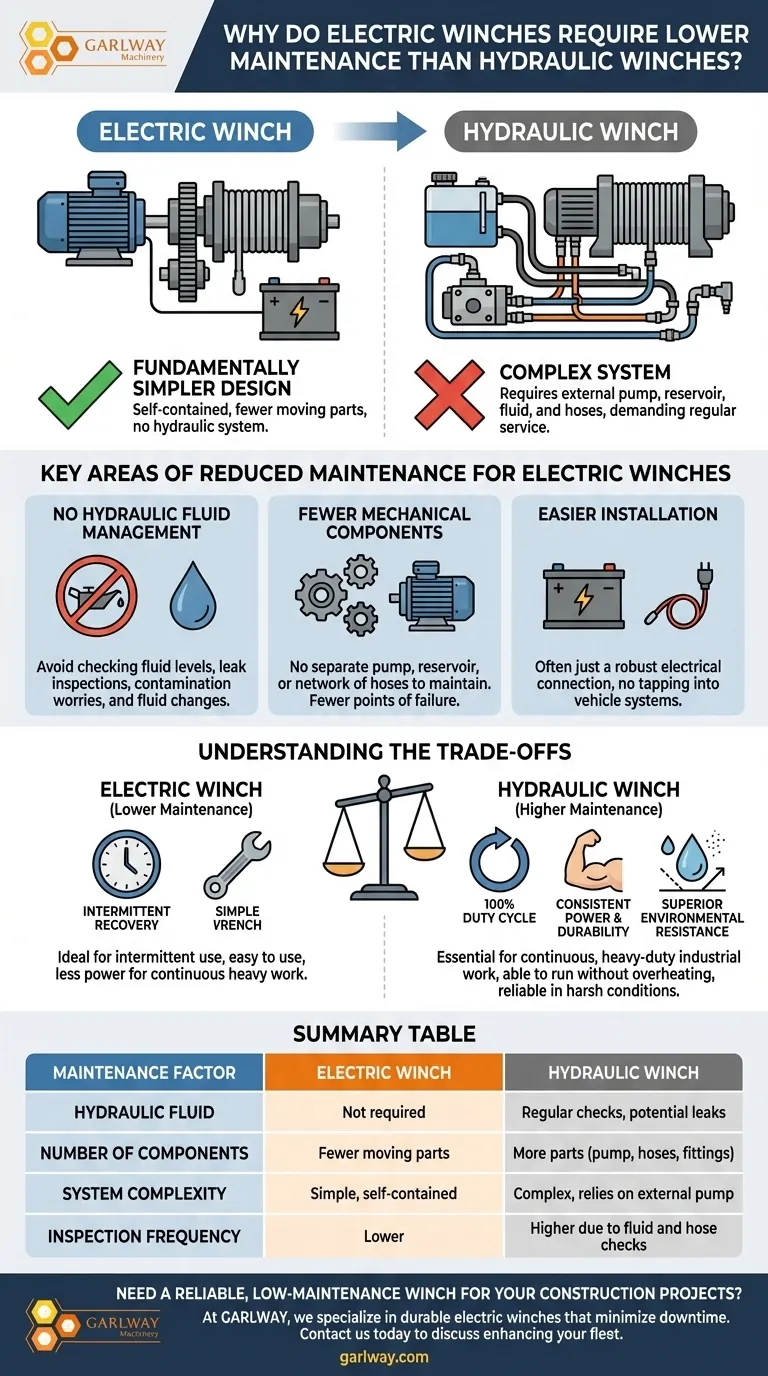At its core, an electric winch requires less maintenance because its design is fundamentally simpler. It has fewer moving parts and, most critically, eliminates the entire hydraulic fluid system—a common source of maintenance tasks, potential leaks, and component failure in hydraulic winches.
The key distinction is system complexity. Electric winches are self-contained electrical and mechanical units, whereas hydraulic winches are complex systems involving pumps, lines, and fluid that demand regular inspection and service.

The Core Difference in System Design
To understand the maintenance gap, you must first visualize how each winch operates. The difference in their power source dictates their complexity.
Electric Winch Simplicity
An electric winch is a straightforward device. It consists of an electric motor connected to a gear train, powered directly by the vehicle's battery. This direct-to-work design minimizes the number of components that can wear out or fail.
Hydraulic Winch Complexity
A hydraulic winch is one part of a larger system. It relies on a hydraulic pump, which is typically driven by the vehicle's engine. This pump circulates pressurized hydraulic fluid from a reservoir, through hoses and fittings, to the winch motor, which then drives the gears.
Key Areas of Reduced Maintenance for Electric Winches
The simpler design of an electric winch translates directly into fewer and easier maintenance responsibilities.
No Hydraulic Fluid Management
This is the single biggest factor. With an electric winch, you completely avoid the need to check hydraulic fluid levels, inspect for leaks in lines and fittings, worry about fluid contamination, or perform periodic fluid changes.
Fewer Mechanical Components
A hydraulic system introduces multiple points of potential failure. There is no separate pump to service, no reservoir to check, and no network of hoses to inspect for cracks or abrasion on an electric winch. Fewer parts mean fewer opportunities for mechanical issues.
Easier Installation
While not a maintenance task itself, the simpler installation of an electric winch is relevant. It often requires just a robust electrical connection, whereas a hydraulic winch involves tapping into the vehicle's power steering system or adding a dedicated pump, which adds complexity from day one.
Understanding the Trade-offs
Lower maintenance does not mean superior in every situation. The complexity of a hydraulic system exists for a reason, providing significant performance advantages that are critical for certain applications.
Unmatched Duty Cycle
Hydraulic winches can pull for long periods without stopping. The hydraulic fluid helps dissipate heat, allowing for a 100% duty cycle. Electric winches, by contrast, generate significant heat and can overheat, requiring rest periods during heavy, continuous use.
Consistent Power and Durability
Hydraulic systems are the standard for heavy industrial use. They provide consistent, high-torque pulling power that is not dependent on battery charge. They are often built to withstand more extreme and continuous workloads.
Superior Environmental Resistance
A sealed hydraulic system is inherently more resistant to water, mud, and dust. This makes them exceptionally reliable for vehicles that will be submerged or operated in the harshest possible conditions.
Making the Right Choice for Your Application
Choosing between electric and hydraulic is a matter of matching the tool to the task and accepting the corresponding maintenance load.
- If your primary focus is intermittent recovery and ease of use: An electric winch is the clear choice, offering more than enough power for most situations with minimal maintenance.
- If your primary focus is continuous, heavy-duty industrial work: A hydraulic winch is essential, and you must factor its required maintenance schedule into your operational plan.
Ultimately, understanding this trade-off between simplicity and endurance is the key to selecting the right tool for your needs.
Summary Table:
| Maintenance Factor | Electric Winch | Hydraulic Winch |
|---|---|---|
| Hydraulic Fluid | Not required | Regular checks, potential leaks |
| Number of Components | Fewer moving parts | More parts (pump, hoses, fittings) |
| System Complexity | Simple, self-contained | Complex, relies on external pump |
| Inspection Frequency | Lower | Higher due to fluid and hose checks |
Need a reliable, low-maintenance winch for your construction projects?
At GARLWAY, we specialize in durable construction machinery, including electric winches that minimize downtime and simplify your operations. Our winches are designed for construction companies and contractors who value efficiency and reduced upkeep.
Contact us today to discuss how our electric winches can enhance your fleet's performance and cut maintenance costs. Get in touch now!
Visual Guide

Related Products
- Electric and Hydraulic Winch for Heavy Duty Applications
- Electric 120V Boat Winch by Badlands
- 12000 lb Heavy Duty Electric Boat Winch
- Electric Hoist Winch Boat Anchor Windlass for Marine Applications
- Heavy Duty Electric Boat Winch Windlass Anchor
People Also Ask
- What are the main advantages of using electric winches for vehicle recovery? Gain Safety and Self-Sufficiency
- In what scenarios is a winch particularly useful for trailers? Load Heavy Items Safely & Efficiently
- How do drum winches improve the overall boating experience? Effortless Anchoring for More Fun on the Water
- What are the common uses of an electric winch? A Guide to Safe and Efficient Heavy Lifting
- What industries commonly use electric winches? Powering Efficiency Across Key Sectors
- What are the primary uses of winches in the construction industry? Essential for Lifting, Pulling & Safety
- What safety features should be considered in a winch for vehicle loading? Ensure Safe & Secure Loading Every Time
- How do electric winches contribute to operational safety? Enhancing Control and Reducing On-Site Risks



















